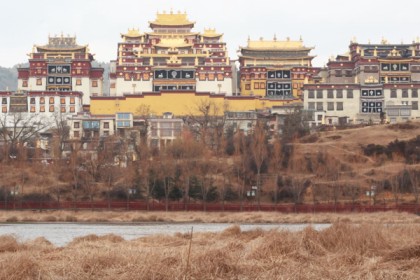Table of Contents
Describe a Place In Your Country That You Think Is Interesting

Cue Card
You should say:
- Where it is
- How you knew it
- What special features it has
- And explain why you think it is interesting
Sample Answer 1
An interesting place in China is the Forbidden City, which is located within Beijing. It’s a very old palace that was built hundreds of years ago yet still stands strong today.
I first learned about it from my grandparents, who would often tell me stories about Chinese history when I was young.
I then discovered more about the Forbidden City when I began going to school. I haven’t been there yet, but it’s something on my bucket list, as it would be a shame for me not to see this iconic Chinese landmark.
From what I’ve read, it’s a very large palace complex consisting of many buildings and roads within. Encircling it is a huge wall that soldiers once patrolled to keep the emperor safe.
Inside, visitors can view the many things the emperor and other royal officials once used, such as old furniture, ancient pottery, and many more.
For me, the Forbidden City symbolizes the majesty of China, rich in history and artistic beauty. It’s an architectural wonder made long before mechanized machines, so it’s definitely something to see.
The fact that it still strikes awe in the hearts of citizens and foreigners alike means it’s something to be proud of, which is why I plan on visiting it after graduation.
Sample Answer 2
One of the most fascinating places in my country that I find truly interesting is the ancient city of Varanasi, located in the northern state of Uttar Pradesh, India. I first learned about Varanasi through books, documentaries, and conversations with friends who had visited this iconic city.
Varanasi, often referred to as “Kashi” or “Banaras,” is one of the oldest continuously inhabited cities in the world, with a history dating back over 3,000 years. It is situated on the banks of the sacred Ganges River and is considered the spiritual heart of India. What makes Varanasi truly special are its unique features and cultural significance.
One of the most remarkable aspects of Varanasi is its spiritual aura. The city is a major pilgrimage site for Hindus, attracting thousands of devotees and tourists every year. It is believed that taking a dip in the holy Ganges River in Varanasi can cleanse one’s sins, and cremation ceremonies along the riverbanks are an integral part of Hindu funeral rituals. The sight of these ceremonies, with funeral pyres burning day and night, is both solemn and awe-inspiring.
Varanasi is also renowned for its labyrinthine alleyways, narrow streets, and vibrant ghats (steps leading to the river). Each ghat has its own significance and history, and they are used for various purposes, including bathing, meditation, and cultural events. The Dashashwamedh Ghat is famous for its daily Ganga Aarti ceremony, a mesmerizing ritual that draws large crowds to witness the spectacle.
Furthermore, the city is a hub of art, music, and learning. Varanasi has a rich tradition of classical music, and it is known for producing eminent musicians and scholars. The Banaras Hindu University, one of India’s premier educational institutions, is also located here.
What makes Varanasi interesting to me is its ability to seamlessly blend ancient traditions with modern life. It’s a city where spirituality, culture, and history coexist harmoniously. The sheer intensity of experiences, from watching sunrise boat rides on the Ganges to exploring centuries-old temples and mingling with pilgrims from around the world, makes Varanasi a captivating destination.
In conclusion, Varanasi’s historical significance, spiritual depth, and cultural richness make it an endlessly interesting place in my country. It offers a unique glimpse into India’s diverse and profound cultural tapestry, making it a must-visit destination for anyone secking to explore the essence of this remarkable country.
Part 3
1. How can people access travel information?
People can access travel information through various means.
Some common sources include travel websites and apps, travel guidebooks, tourism bureaus, travel agencies, social media platforms, and personal recommendations from friends and family who have visited a particular destination.
2. Do people have different personalities in different regions of your country?
Yes, people may exhibit different cultural behaviors and regional personalities in different parts of my country.
These differences can be influenced by factors such as local traditions, customs, climate, and historical backgrounds.
3. What causes the differences between different regions of your country?
Regional differences in my country can be attributed to a combination of historical, geographical, and cultural factors.
Historical events, migrations, and the influence of neighboring regions can shape the unique characteristics and traditions of each area
4. Is it just youngsters who like to try new things, or do people of your parents’ age also like to try new things?
People of all age groups can have a desire to try new things.
While younger individuals may be more adventurous and open to new experiences, many people of their parents’ age also enjoy trying new activities, exploring new places, and embracing change.
5. Is a great tourist destination also a good place to live?
Not necessarily. A great tourist destination may offer unique attractions and experiences for visitors, but it may not always be an ideal place to live.
Factors such as cost of living, infrastructure, employment opportunities, and quality of life can vary, and what makes a place appealing to tourists may not align with what makes it suitable for long-term residents.
6. Why do people go to live in small towns and think that they are more interesting than the big cities?
People who choose to live in small towns may find them more interesting than big cities for several reasons.
Small towns often offer a slower pace of life, a stronger sense of community, lower costs of living, and a connection to nature.
Additionally, some individuals prefer the charm and simplicity of small-town living over the hustle and bustle of urban environments. It ultimately comes down to personal preferences and priorities
Some IELTS Speaking part 2 cue-cards you may like :
- (2024) Describe a Difficult Task That you Completed At Work/Study That You Felt Proud Of
- (2024) Describe a Time That Something Changed Your Life In Good Ways
- (2024) Describe a Good Advertisement That You Think Is Useful
- (2024) Describe a Bad Service You Received In a Restaurant/Shop
- (2024) Describe a Rule That Is Important In Your School Or At Work
- (2024) Describe a Drawing/Painting That You Like
- (2024) Describe a Foreigner Who Speaks Chinese Well
- (2024) Describe a Park Or a Garden In Your City
- (2024) Describe a Person Who Enjoys Cooking For Others
- (2024) Describe An Invention That Is Useful In Your Daily Life
- (2024) Describe A Famous Person You Are Interested In
Credits
Image : Photo by Sifan Liu on Unsplash


